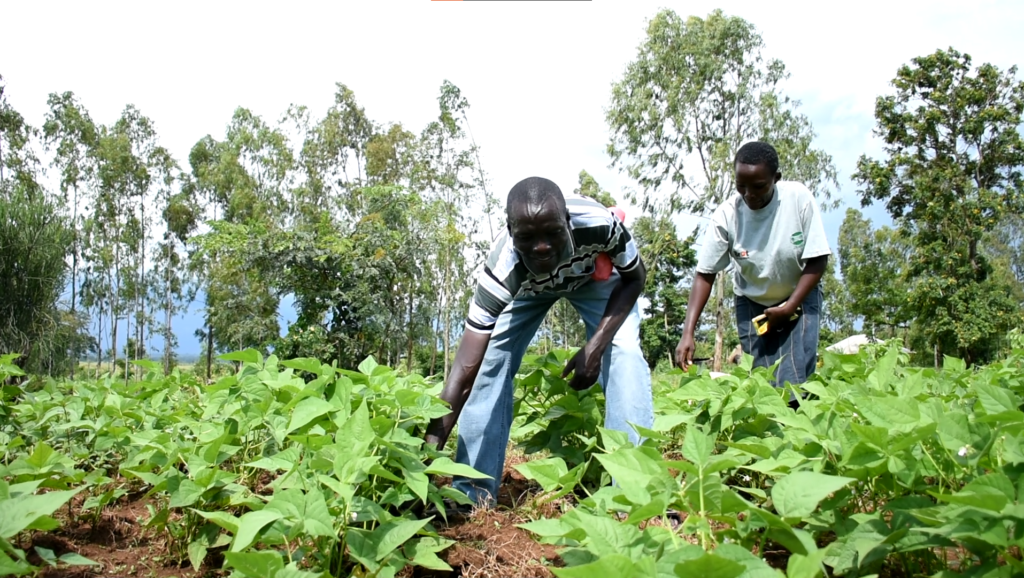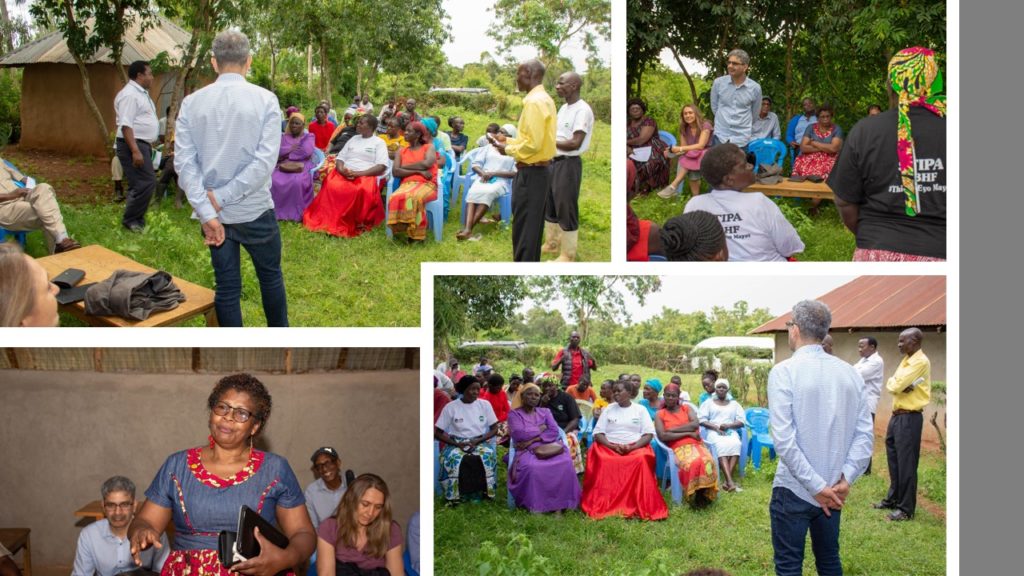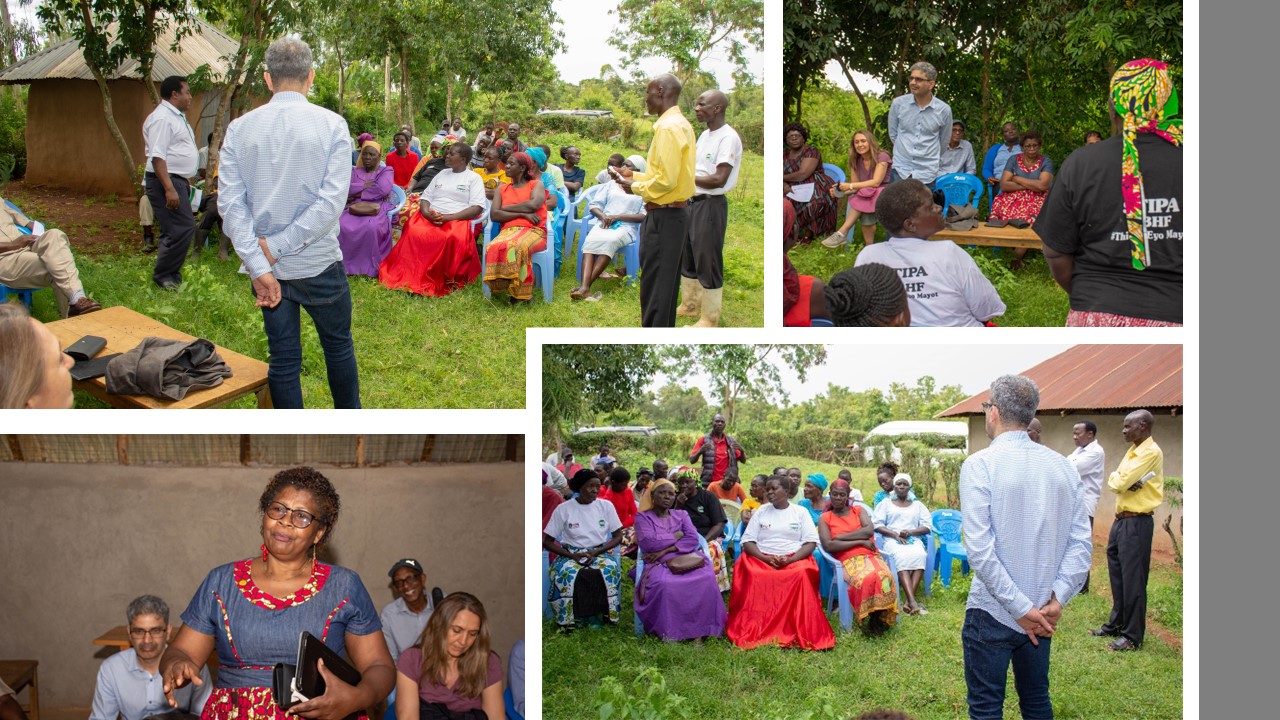The long-standing partnership between PABRA and the Canadian government spans over two decades. This partnership has been through initiatives towards food, income, and nutrition security in sub-Saharan Africa ensuring rural women are the biggest beneficiaries across these countries. Canada through its partnership has supported research initiatives that have put new varieties of beans in farmers’ hands. Smallholder farmers in Africa such as Mr. Ondiege in Kenya have realized the insurmountable benefits of growing new varieties of beans not just for food at home but to share with his community to reap its benefits. The impact of this support has been shared across most countries where PABRA works. Most farmers are aware of the benefits of the new beans to their diets and the money in their pockets.

It is for the above reasons that Mr. Tarik Khan, the Director-General, the Pan-Africa Bureau of Global Affairs Canada (GAC), together with a delegation from Global Affairs Canada visited with Gendro community recently to understand the impact that Canada’s funding has had on communities in Kenya. His visit to Gendro Community is a good step in understanding the transformed livelihoods of millions of smallholder farmers such as Ondiege’s family understanding how the whole partnership and conversion to new beans happened. “I am pleased by the work happening with the farmers. Canada is recognizes the importance of collaboration from research up to the farmer to take up new research.” Mr. Khan said.
“Low-yielding beans taking long to mature and harvest, have a lot of gas and the grain appearance of the local variety (Nyamango) was not pleasant,” Mr. Elias Ondiege Hayoyo, a smallholder farmer in Siaya county, Kenya shared. Before 2020, farmers from Gendro Village in Siaya county would cultivate the local variety Nyamango, meaning grain with big seeds, since it was the only readily available variety at that time. A collaboration between researchers, farmers and donors, resulted in new high-yielding varieties of better nutritional value to replace the old ones such as Nyamango.
Kenya recently released four new varieties: Angaza, Faida, Nyota and Metameta. These varieties have been vetted for their unique features of being climate-smart, higher-yielding and tolerant to most pests and diseases. One of these four varieties, Nyota, is a favorite to most farmers not just in Siaya, because it is high-yielding, early maturing in only 65 days and fast-moving in the market.
True to its name, the Nyota bean is a star to most smallholder farmers in Kenya. Mr. Ondiege and his wife recount how, in 2020, they were introduced to the Nyota bean by the Kenya Agricultural and Livestock Research Organization (KALRO); a member of the Pan-Africa Bean Research Alliance (PABRA) in partnership with Support for Tropical Initiatives in Poverty Alleviation (STIPA), a Non-Governmental Organization collaborating with farmers in Siaya to promote and disseminate three newly released, high-yielding and drought-tolerant bean varieties from KALRO.

In the photo: Mr. and Mrs. Ondiege checking up on their bean farm
In addition to introducing these new varieties to farmers, STIPA and KALRO trained lead farmers of the Gendro Community on climate-smart agricultural practices. Trainers shared new knowledge and practices with other community members. For instance, initially, farmers were practicing intercropping of maize and local bean varieties, but after getting new bean varieties from STIPA, they started growing pure stand bean production. Where one kilogram of these beans is planted, about 40 kilograms are harvested, compared with 10 kilograms harvested from local varieties using the same quantity of seed.
The Ondiege’s have since increased the size of the land they are using to grow beans over the four seasons, from half an acre to two acres. Through the sale of beans, they pay school fees for their children. The bean surplus from the harvest is sold to nearby schools, neighbors, and hotels within the village. ‘’The money paid for school fees for the children, and I also recently bought a goat.” Shared Mr. Ondiege.
The Ondieges are champion farmers from the Gendro Farmers group who received and shared the new bean variety seed among other group members at a subsidized price, after their second season harvest. They also train the group’s farmers on improved production practices from STIPA pieces of training.
“My neighbors are my priority, and when I prosper, they prosper,” added Mr. Ondiege. “Since I started growing these beans, I make sure that I also share at least one kilogram of the bean seed with them, with the promise that once they harvest from their farms, they should bring back the one kilogram to be shared with another farmer. I have seen that this has encouraged most of them to grow the improved beans.’’ In just two years, the 4,500 farmers in the group are now planting Nyota.
Gendro Community farmers plan to increase their production and work with market groups to purchase beans from the collection point set up in the community where the farmers will aggregate their beans. This will help increase their bean harvest sales since they have the market. As a result of these impressive results from Gendro, STIPA has decided to expand the approach to Vihiga, Narok, HomaBay and Migori.
The PABRA’s future and that of its partners looks bright as the model of partnership and research is being shared across various crops, not just beans.
Speaking during the visit, Dr. Felista Makini, Crops Director at KALRO emphasized the importance of strong collaboration with partners to realize impressive results. ‘’We are seeing these results because the KALRO bean program understood farmers’ needs and matched research to improve their livelihoods,’’ she said.
STIPA with farmers to promote the new bean varieties, particularly Nyota, promoting large-scale production for marketing. STIPA also works to link most of its farmers to the market to grow their income by cultivating beans.


